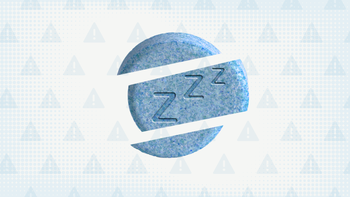
Is Melatonin Safe to Take Every Day for Sleep?
Key takeaways:
Melatonin is a popular over-the-counter supplement for sleep. Short-term melatonin use is considered safe for most people. But you shouldn’t take it every day for more than a week or two at a time.
If you need to take melatonin for more than a week or two, you likely have a chronic sleep issue that should be looked at by a healthcare professional.
Keep in mind that melatonin has side effects and drug interactions to consider. So it’s best to check with your healthcare team before taking it to make sure it’s a safe option for you.
Access savings on related medications
Table of contents
If you’ve ever had trouble sleeping, you know what a pain it can be. Not only can you feel tired and groggy the next day, a lack of sleep can also have negative effects on your health. So it’s no wonder that many people reach for an over-the-counter (OTC) product to help them sleep.
A popular choice is melatonin, an OTC dietary supplement. People commonly take melatonin supplements for jet lag or insomnia. But is it safe to take melatonin every day?
What is melatonin?
Melatonin is a hormone, or chemical messenger, that your brain naturally makes when it becomes dark at night. It sends the message to the rest of your body that it’s bedtime and helps regulate your sleep cycle. Melatonin supplements mimic the effects of natural melatonin in the body. So it may help you fall asleep faster or adjust to a different time zone.
What it feels like to take melatonin: Four people share their experiences with this sleep aid.
Melatonin dosages: Read up on the suggested doses for adults and children to figure out which dose is right for you.
Medication-free tips: Try these strategies to help you fall asleep faster, without medication.
Is long-term melatonin use safe?
There aren’t enough studies to say whether long-term melatonin use in adults or children is safe. A few clinical trials suggest that long-term melatonin use may cause mild side effects compared to placebo (a pill with no medication in it). But more research is needed to confirm the long-term safety of melatonin supplements.
Is it safe to take melatonin supplements every night?
It’s probably OK to take melatonin every night, but only for up to a week or two at a time. If your sleep issues are lasting longer than that, you may have insomnia (chronic sleep problems).
Insomnia is something you should talk about with a healthcare professional (HCP). They can help determine what’s causing it and help you decide on the best solution — and it may not be melatonin. Many health experts, including the American Academy of Sleep Medicine, don’t recommend melatonin supplements for insomnia due to a lack of evidence that it’s effective.
Your prescriber may tell you it’s OK to keep taking melatonin once they’ve looked at your overall health. They may also recommend switching to ramelteon (Rozerem), a prescription medication that works similarly to melatonin. It’s considered safe to take for up to 6 months. But it’s best to avoid taking melatonin (or any sleep aid) every day unless you’ve been told it’s OK by an HCP.
Good to know: Melatonin is a dietary supplement, not an FDA-approved medication. Supplements aren’t well regulated, so choosing a low-quality product could put your safety at risk. One study found that over 70% of melatonin supplements contained a significantly different amount of melatonin than what was listed on the bottle. If you’re interested in taking melatonin supplements, talk with your healthcare team about how to choose the right product.
Does long-term melatonin use lead to health risks?
The health risks of long-term melatonin use are still unknown due to a lack of high quality studies. But taking melatonin for a short time seems to be safe for most adults (we’ll talk about the risks for children next).
Some prescription sleep medications can be habit-forming, and they aren’t recommended for those with a history of substance-use disorder. But melatonin doesn’t have this issue, even with long-term use.
Keep in mind that long-term sleep issues are typically a sign of an underlying health condition. So taking melatonin long term without talking to a healthcare professional could allow that condition to worsen, which could affect your overall health.
Good to know: Melatonin is safe for most people, but it still has side effects and drug interactions to consider before you start taking it. So it’s always a good idea to check in with your healthcare team before trying a melatonin supplement to help you sleep.
Is melatonin safe for kids?
Melatonin seems to be safe for kids, but it should only be given in certain situations. Melatonin may help improve sleep issues caused by health conditions such as attention-deficit hyperactivity disorder (ADHD), autism spectrum disorder, or insomnia in children.
It’s best, however, to avoid giving melatonin to children for a long period of time. It’s been linked to behavioral and hormonal changes that aren’t well understood. So it’s best to stick to short-term use in children until we know more about these and other risks of children taking melatonin long term.
Children who don’t have a health condition that’s causing their sleep issues shouldn’t take melatonin in most cases. And you shouldn’t give your child melatonin without checking with their pediatrician first.
How much melatonin is safe to take?
The most common melatonin dosage for adults is around 3 mg to 5 mg taken 1 to 2 hours before bedtime. It’s best to start with a low dose (1 mg to 2 mg) and increase it if needed. Doses over 8 mg are more likely to cause side effects and aren’t typically recommended.
Children typically need a lower melatonin dose than adults. But the recommended dose varies depending on the child’s age and what’s causing their sleep issues. Your pediatrician can help you choose the best melatonin dosage for your child’s needs.
If you take too much melatonin, you could experience excessive nausea, dizziness, or drowsiness. But it isn’t likely to be life-threatening for adults. That being said, be sure to keep melatonin out of the reach of children. Accidental overdoses of melatonin in kids went up by 530% between 2012 and 2021 and led to two deaths.
Keep in mind that only oral forms of melatonin are backed by clinical studies. Melatonin vape pens and diffusers haven’t been shown to be safe or effective and should be avoided.
If you or a loved one takes too much melatonin, it’s best to contact your prescriber or call Poison Control at 1-800-222-1222. They’ll help decide what your next steps should be.
Who shouldn’t take melatonin?
It’s best to avoid taking melatonin if you’re pregnant or breastfeeding. We don’t have clear information about whether taking melatonin is safe during these times. And OTC supplements can contain contaminants or unlisted ingredients that could be harmful. So it’s best to avoid melatonin supplements unless your healthcare team recommends them.
It’s also best to avoid taking melatonin if you have kidney problems that require dialysis. Your kidneys help remove melatonin from the body, so melatonin levels can go too high if your kidneys aren’t working properly.
Melatonin can also lower your blood pressure and increase your risk of bleeding. So if you have a heart condition or you’re taking other medications that can increase your bleeding risk, it’s best to avoid melatonin unless your prescriber OK’s it.
The bottom line
Melatonin is a popular over-the-counter supplement for sleep. It’s safe for most people to take melatonin for a short period of time. But it isn’t recommended to take melatonin every day for more than a week or two. There isn’t good information about whether it’s safe to take melatonin long term. And chronic sleep issues should be evaluated by a healthcare professional.
Keep in mind that even though short-term melatonin use is considered safe, there are still side effects and drug interactions to consider. So it’s best to discuss melatonin with your healthcare team to make sure it’s safe for you before you try it.
Why trust our experts?



References
Andersen, L. P. H., et al. (2016). The safety of melatonin in humans. Clinical Drug Investigation.
Boafo, A., et al. (2019). Could long-term administration of melatonin to prepubertal children affect timing of puberty? A clinician’s perspective. Nature and Science of Sleep.
Bryant Ranch Prepack. (2024). Ramelteon- ramelteon tablet [package insert].
Endocrine Society. (2022). Brain hormones.
Erland, L. A. E., et al. (2017). Melatonin natural health products and supplements: Presence of serotonin and significant variability of melatonin content. Journal of Clinical Sleep Medicine.
Ferracioli-Oda, E., et al. (2013). Meta-analysis: Melatonin for the treatment of primary sleep disorders. PloS One.
Lelak, L., et al. (2022). Pediatric melatonin ingestions — United States, 2012–2021. Morbidity and Mortality Weekly Report (MMWR).
National Library of Medicine. (2024). Melatonin. Drugs and Lactation Database (LactMed).
Paribello, P., et al. (2022). Melatonin and aggressive behavior: A systematic review of the literature on preclinical and clinical evidence. Journal of Pineal Research.
Sateia, M. J., et al. (2017). Clinical practice guideline for the pharmacologic treatment of chronic insomnia in adults: An American Academy of Sleep Medicine clinical practice guideline. Journal of Clinical Sleep Medicine.
Savage, R. A., et al. (2022). Melatonin. StatPearls.
Verteramo, R., et al. (2022). The role of melatonin in pregnancy and the health benefits for the newborn. Biomedicines.
Was this page helpful?
Related Articles
Browse medications
View AllResearch prescriptions and over-the-counter medications from A to Z, compare drug prices, and start saving.


























